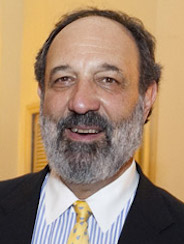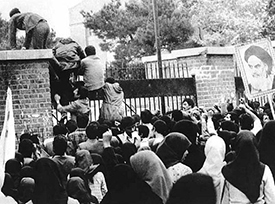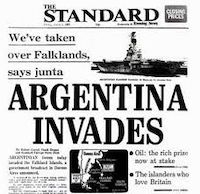Moments in Bank History
Bankers in Danger, Part 1 | Part 2 | Part 3
Work or Flight?
 By Robert Aberlin: 40 Years Ago/Argentina & the Falkland War
By Robert Aberlin: 40 Years Ago/Argentina & the Falkland War
April 2, 1982 is a date 40 years ago that is seared in my memory. That day, as I was stationed in my office at Chase in Argentina, we received news that the Argentine amphibious force had taken over the Malvinas (the Argentine name for the Falklands Islands). That evening we were invited to the apartment of good Argentine friends for a celebration with champagne. The family’s brother-in-law had been the marine captain in charge of one of the landing craft. Everyone was telling my wife and me why, after so many decades, they were just taking back what had always been theirs. Two days before, on March 30, YPF (the government oil company) had requested a $150MM drawdown of a syndicated Euro-dollar loan that we had agented. Participants in that loan included two English banks who let us know that there was no possibility of funding a loan to an entity owned by a government that had just enacted an act of war.
The next day I was in a conference with New York, and we decided to try to have YPF retract their request for a drawdown. As I remember, we had one or two days to achieve this. On April 3, I met with the manager of the Central Bank and with the Central Bank’s chief legal counsel. I tried to explain that, if required to fund, many of the European banks would invoke the “material adverse change clause” and that might throw all Argentine debt into default. I was told that all they were doing was taking back what was theirs—not an act of war. They said they were going to talk to the Argentine equivalent of the Secretary of State, who at the time was at the U.N. speaking on the situation. I gave them Arjun Mathrani’s number in New York, and they asked me to sit in the room while they went out to confer.
About an hour later the chief counsel came back into the room by himself and said, “Put Up Your Hands." The look on my face must have said everything, because he laughed and said, “Just kidding.”. Not a joke in my mind. In any case the discussions moved to New York and YPF retracted their request.
On May 2, as British forces came to take the islands back, the Argentine cruiser Belgrano was sunk by a British submarine. The U.S. Embassy suggested nonessential personnel should be asked to leave the country. The staff of the Chase Bank was entirely Argentine except for four of us from the United States. So that no one was aware of it, I went to the airport to meet Bob Benoit, who at the time was Chase’s manager in nearby Paraguay. Bob got off the plane, handed me an envelope with $12,000 in it, turned around and flew back to Paraguay. Each of the four of us was told to keep $3,000 and use it to buy tickets out of the country or for whatever else we might need. Although the war was far away, police often came to our apartment to ask if we were English. Our doorman always told them we spoke Spanish with an accent because we were Bolivian.
My wife was eight months pregnant and in mid-May we were told to get pregnant wives out of the country. We had a choice of going to Uruguay, Chile or back to New York. Since our child was due in three weeks, we bought a ticket on Lufthansa (no U.S. carriers were flying) and flew to Santiago, Chile, where country manager Harry Tether was able to help us with accommodations and health requirements. I commuted on weekends from Argentina to Chile until our son was born on June 1.
Because we weren’t Chilean residents, he only had U.S. identification papers (passport). Chase’s Chilean lawyer went with me after the war was over to try to get a visa for our son to get into Argentina. The Argentine official took his passport and began screaming at me that I should get the visa from Margaret Thatcher or General Haig. He then disappeared for over an hour, came out and threw the passport at us but with a visa stamped in it.
But the story doesn’t end there. We were at the airport to leave Chile and the Chilean immigration official asked where our son’s entry visa was. We showed his birth certificate but the official said the 3-week old would need a police good-conduct certificate. The immigration official's boss finally came over, stamped the child in and stamped him out, and the 2½-month saga ended.
Our son will be 40 years old this week.
(Posted May 26, 2022)
By Ed von Leffern, Lt Col USAF retired, about experiences in and around geopolitical conflict:
 An early experience was in 4/30/1975 when Chase evacuated 120 Saigon staff and their families. We volunteered to host Chu Nguyen van Trinh’s family of five. He was the General Service Manager of the Chase Saigon branch, but his family spoke no English. They were limited to bringing a tiny airline bag and packed it with photos. I picked them up in the evening at JFK and drove them to our home in Suffern. They stayed with us for about three months, but the family assumed that all of America looked like homes in Suffern.
An early experience was in 4/30/1975 when Chase evacuated 120 Saigon staff and their families. We volunteered to host Chu Nguyen van Trinh’s family of five. He was the General Service Manager of the Chase Saigon branch, but his family spoke no English. They were limited to bringing a tiny airline bag and packed it with photos. I picked them up in the evening at JFK and drove them to our home in Suffern. They stayed with us for about three months, but the family assumed that all of America looked like homes in Suffern.
 I wanted to repay the Vietnamese for my pre-Chase experience of 126 combat missions in their country; but we all learned a lot. There was a nuoc mam (fish sauce) smell in our refrigerator. We gathered a truck load of used furniture from neighbors for their future rental with other Vietnamese families in Hoboken. Mr. van Trinh became very defensive. In Asia, if someone provides aid or assistance, there is a mutual assumption that it will be repaid. Americans get joy out of giving, but he couldn’t ever repay this generosity and that cultural difference caused an issue. Nevertheless, the family became very successful. The mom and three children each earned a college degree. The son became a very successful engineer in Silicon Valley. (Photo at right: The van Trinhs in traditional dress)
I wanted to repay the Vietnamese for my pre-Chase experience of 126 combat missions in their country; but we all learned a lot. There was a nuoc mam (fish sauce) smell in our refrigerator. We gathered a truck load of used furniture from neighbors for their future rental with other Vietnamese families in Hoboken. Mr. van Trinh became very defensive. In Asia, if someone provides aid or assistance, there is a mutual assumption that it will be repaid. Americans get joy out of giving, but he couldn’t ever repay this generosity and that cultural difference caused an issue. Nevertheless, the family became very successful. The mom and three children each earned a college degree. The son became a very successful engineer in Silicon Valley. (Photo at right: The van Trinhs in traditional dress)
Shortly thereafter I was assigned to Seoul, Korea as Corporate Accounts Manager (1975-79). There has never been a signed treaty ending the Korean War, and initially our country $$ limit was only $5 million. Every week South Korea held air raid drills and there was a 10 pm curfew. There was a fear that North Korea would invade, and Chase wanted to limit its exposure.
Chase had a proactive policy toward military reservists. After active duty, I joined the Air Force Reserves as an Intelligence Officer and did reserve duty in Korea. Typically, reservists work one weekend every month and two weeks in the summer. The Chase branch worked on Saturday, so I did my duty participating in and later writing war game exercises. I had a top secret security clearance and access to any CIA analysis, although I couldn’t share that info.
On one two-week tour, I substituted for a Marine lieutenant colonel friend who was Deputy Commander of the UN Command Post in Korea and on vacation. One week David Rockefeller was visiting Korea for a country risk analysis. Major General John Singlaub, a former CIA Executive, was Chief of Staff of U.S. Forces in South Korea. He publicly criticized President Carter on Korea in the Washington Post. I arranged a dinner with Rockefeller, Singlaub and myself to discuss Korean risk. David was active in the Trilateral Commission and was quite knowledgeable on foreign policy. Singlaub was vocally criticizing North Korean risk and said “the Commies are going to take over the Singapore Straits”. He lost all credibility with Rockefeller, and we got a large country risk increase. We also set up a lunch for David with Chairman Cho of Korean Airlines (KAL). That was a mistake, as we had no credit facility with KAL, and per Korean culture it implied that we wanted a credit line.
Our lending strategy with Chase Hong Kong was to organize syndications and sell off our exposure. At 6 pm on Friday night, we received a message from the Korean Central Bank that wanted an immediate offer the next day to syndicate $400 million for KAL. Oliver Greeves, our country manager, was in England on vacation. It was the Chinese New Year’s weekend. I called the syndication group in HK and obtained pricing information. But I couldn’t reach Jim Bish or anyone in the Regional Credit area. I wrote a best effort letter of interest to the Central Bank subject to many conditions including internal credit approval. Unfortunately, the Korean government informed The Wall Street Journal in HK that Chase committed to this syndication and the latter published the article on Monday. Was I in trouble! Ultimately, we approved it, retained $7 million, and obtained a 0.5% fee on the entire sold off portion.
Alan Delsman wrote an article on Iran. A close friends of ours, Mohammad Mrhrabad , was an Iranian diplomat working as Korean head of the Iranian National Oil Company. The seizure of the American Embassy put him in a difficult position. He was immediately transferred back to Tehran and at risk.
At my next Chase assignment in Los Angeles, I was also the Commander of an AF Reserve unit at March AFB, CA. On 8/2/1990, Saddam Hussein invaded Kuwait with the aim of acquiring the nation’s large oil reserves and to cancel a large debt Iraq owed to Kuwait. Unlike Ukraine, the invasion of Kuwait was completed in 48 hours. I received a call that morning from the Pentagon requesting AF Reserve volunteers to fight in Desert Storm. About 75% of my unit volunteered to serve among the 40,000 of reserves who were sent to the Middle East. I received quick approval to volunteer from Chase and my wife, and on the next morning I was deployed as Deputy of Targeting for the first three days of the war. We targeted airfields, radars and all communication sites, so Saddam had no knowledge of war zone information. CNN was allowed to operate and was probably Saddam’s source of information. General Schwarzkopf’s contingency plans included misinformation of marines landing on the coast. Instead, he attacked from the West and overran Iraq’s right flank. (NOTE: 1990: J.P. Morgan & Co. is instrumental in arranging a US$5.5 billion loan to help rebuild Kuwait after the Gulf War.)
(Posted March 11, 2022)
When the civilian government was overthrown, the military took charge: Most foreign-owned entities were expropriated and assets frozen.
C hase Manhattan Chairman David Rockefeller, in keeping with the Bank's expansion strategy, met with the then Argentinian head of state, General Videla, and negotiated the repatriation of Banco Argentino del Comercio, in which Chase owned a financial interest. (Photo left: DR and Videla, a few years later)
hase Manhattan Chairman David Rockefeller, in keeping with the Bank's expansion strategy, met with the then Argentinian head of state, General Videla, and negotiated the repatriation of Banco Argentino del Comercio, in which Chase owned a financial interest. (Photo left: DR and Videla, a few years later)
Subsequently things cooled and the junta began to "unfreeze" foreign assets, with the thought of normalizing the country’s financial environment.
As a result of the above, Western Hemisphere Operations & Systems (of which I was a member) was charged with travelling to Buenos Aires to determine the status of the Bank with regards to pre- and post-repatriation activities.
It is worth mentioning that, at the time, opposition factions or anti-government forces were actively confronting the military and kidnapping expatriates and “visiting firemen” with some frequency.
I was named as part of a team to perform a "stakeout" of Bank operations prior to formally repatriating the entity. It was a voluntary assignment, due to the inherent risks to foreigners. The team also included a member from Chase Protection unit.
Upon arrival in Argentina, airport security was tight and thorough. The local Bank (BAC) had provided a security individual who escorted the team to the hotel.
On leaving the airport, about a half mile away, we encountered a heavily armed military checkpoint, where we were checked for documents and our vehicle was searched.
Upon checking in at the hotel, all guests had to surrender passports, which were kept till the following day.
During our initial 30-day stay, the team had a “security escort" just about everywhere we went.
However, during a subsequent visit my colleague (W.B.) was kidnapped leaving the hotel.
He was picked up on the street and "shepherded” into an unmarked car, driven out of the city limits, the abductors interrogating him on the way. The abductors ended up confiscating his documents and wallet. He was given bus fare to get back to the city and hotel. Fortunately he wasn't harmed.
Needless to say, after the incident security was tightened and our visits, for the remainder of over a year and a half, were for the most part uneventful.
It wasn't exactly a war zone, but it had its moments.
Posted March 11, 2022
 From Alan Delsman: Post the flight of the Shah from Iran in 1979, the United States met with the Bazargan Government in Morocco. Simultaneously, the U.S. State Department asked U.S. banks to return to Iran to assess the economic conditions to reopen.
From Alan Delsman: Post the flight of the Shah from Iran in 1979, the United States met with the Bazargan Government in Morocco. Simultaneously, the U.S. State Department asked U.S. banks to return to Iran to assess the economic conditions to reopen. In our "Best Hire I Ever Made" series, Joseph Ferrigno nominated Arjun Mathrani. Mariana Abrantes de Sousa sent in this story under the title "The Young Arjun Mathrani: One of the Best People I Ever Worked With!".
 From Mariana Abrantes de Sousa: I was a young officer on the Argentina desk in New York, when the Argentine generals decided to invade the Falklands/Malvinas islands in the South Atlantic on 2-April-1982.
From Mariana Abrantes de Sousa: I was a young officer on the Argentina desk in New York, when the Argentine generals decided to invade the Falklands/Malvinas islands in the South Atlantic on 2-April-1982.
First came incredulity: it must be an April fools joke.
Then can the mutual banking freezes and blockades that impacted a lot of business booked in London and provoked a suspension of payments.
Soon we were working from 7 am to midnight to keep communication going with Chase colleagues in Buenos Aires and to tally up all of Chase's exposure to Argentina.
All of this under the calm and intelligent direction of the Credit Officer Arjun Mathrani. I was learning about crisis management before I had heard the term.
I vaguely remember some sort of bank holiday when Chase Plaza was nearly deserted, perhaps Good Friday, when I had to to go work. I needed to deliver some information to Arjun, but I had visitors, so I went to his office with my naughty 6-year old nephew in tow. Shy for once, he sat down next to Arjun's demure young daughter, while I went in.
A little time later, mischief must have overcome shyness because we could hear them running up and down the lovely long corridor. Much better than trying to sort out one more Argentine crisis!
To get away from the crisis, Chase then sent me to Mexico...in time for the suspension of payments and the nationalization of the banks! But that's another story ...
(Listening to the news today, it sounds like "déjà-vu all over again", this time much worse!)
Have a Story? Comments?
We have published several stories in the past about Chase's activities in Vietnam in the closing days of that war. Were you ever asked to continue working–or struggling to get out of town–in another war zone or amidst other types of violence? Please send your story to Andrea at news@chasealum.org.
